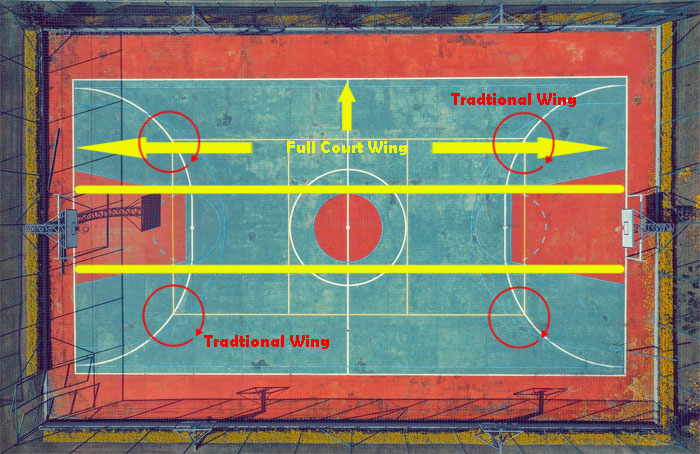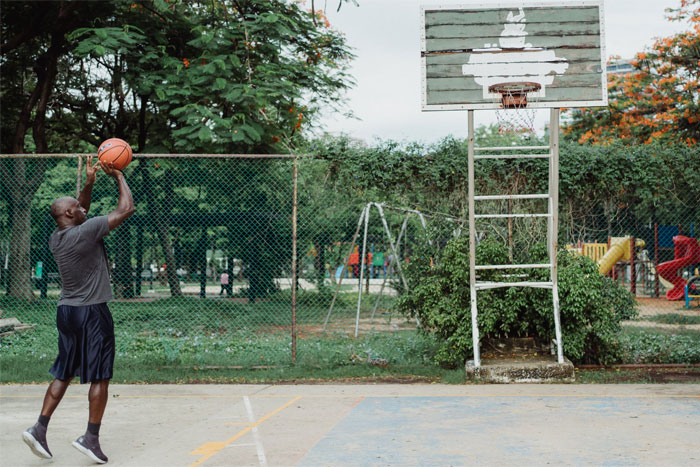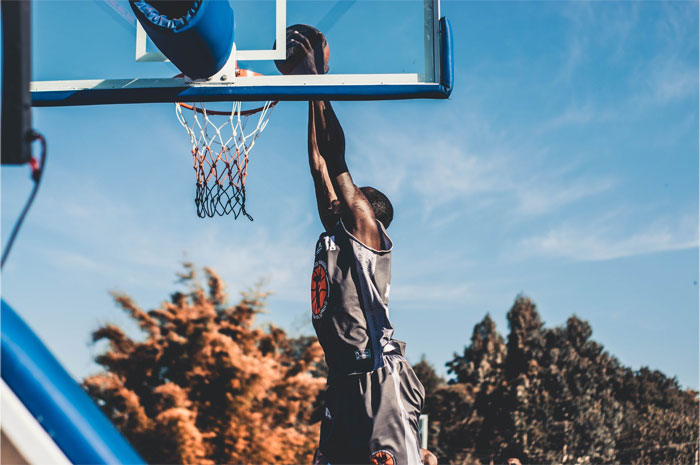You may have heard the term “wing” in the context of basketball quite often. This term is either used to refer to a player or a particular area on the basketball court.
Since the word has two meanings, it can be confusing for inexperienced players or new fans to distinguish between the two. As a result, people often misinterpret the terms and find them difficult to comprehend when taken out of context.
To help you out, we have provided all the relevant details in this article. Once you’ve learned the meaning, you’re one step closer to a slam-dunk!
So, let's clear up any misunderstandings you may have concerning the basketball phrase "wing." Not only will you distinguish between the terminology after reading this article, but you will also have a better understanding of the game!
Wing Area on the Basketball Court
Outside of the free-throw lane, the wing area on a basketball court typically extends from baseline to baseline. So, everything on the court except the painted area is considered a part of the wing area.
The full-court wing and the traditional wing areas on the basketball court are the two types of wing areas.

From baseline to baseline, the full-court wing refers to the court's outer boundaries. The traditional wing, on the other hand, is a spot on the court within the circles. As a result, the full-court wing may be referred to as an area, while the conventional wing is a precise spot.
The coach can efficiently communicate his message to the players, thanks to these designated wing areas. In addition, these regions are crucial for offense play because passing the ball to the wing players creates more space and makes scoring easier.
All in all, it's an excellent position for passing the ball, with fewer opportunities for the opponent to track it down. All players must understand the relevance of the wing region to improved performance.
Wing Players in Basketball
Wing players are often the most talked-about players in a basketball game. This is because they typically possess the necessary skill level to play in the wing positions mentioned above.
Shooting guards and small forwards, sometimes known as swingmen, are the best candidates for this position.
So, let's take a closer look at these players and learn more about their abilities and strengths.
1. Shooting Guard as Wing Player
The shooting guard is a key player since he is in charge of setting the tone and scoring points.
Usually, these players excel in all three aspects of the game: defense, passing, and rebounding.
Skills of a Shooting Guard
A shooting guard has a wide range of abilities, and his team is typically reliant on him. As a result, he must be ready for a variety of unexpected scenarios to respond quickly.
Thus, it is an all-around position that demands a great deal of effort and dedication on the part of the player.
Some of the critical skills of a shooting guard include:
- Sharp Shooting Skills: Because the shooting guard generally plays on the wing, he must be a skilled shooter to score the ball effectively. In most cases, this position is given to the team's best shooter.
- Quick Response Time: Even in the face of adversity, a shooting guard must remain vigilant throughout the game and handle the ball flawlessly. Therefore, he must always be ready to respond and continue scoring.
- Strong Defense: A shooting guard's ability to halt an attack on his team is crucial. This position is vital for a team's defense since the guard must swiftly assess the other team's offense and defend his teammates.
Because the shooting guard plays such a crucial part on the team, he must be capable of filling the skillset of a point guard.

Strengths of a Shooting Guard
Shooting guards have a broad range of talents to play well, but they must have specific distinguishing characteristics that make them unbeatable.
A shooting guard must possess the following qualities to be a good basketball player.
- Intelligence: A shooting guard evaluates each situation thoughtfully and makes quick decisions. He anticipates the opposition team's tactics and devises a strategy to counter them. Overall, his intelligence is the main reason for his advancement on the team.
- Belief: A good shooting guard maintains his confidence even if he misses a shot. Instead of losing hope, he comes back stronger and puts on outstanding performances. Even after several failed attempts, he continues to attack with all his might.
- Patience: Although waiting for the perfect moment to strike can be tricky, a good shooting guard doesn’t get lost in the hassle of making rushed decisions. Instead, he waits for his turn and patiently observes the opposite team’s strategy before the attack.
All of a shooting guard's attributes contribute to his success as a player. If you want to be a shooting guard in the future, you need to hone the skills listed above.
2. Small Forward as a Wing Player
The small forward position is given to the team's shorter and speedier players. They are highly versatile players who can play in various positions and are stronger than the guards.
A small forward player attempts to develop positive relationships with his teammates and leads the team.
Skills of a Small Forward
A small forward player is expected to adopt several roles in the game depending on the situation and mood of the game. These players usually have a strong personality and a good command of their team.
Most of the time, they are the ones that keep the whole squad together.
- High Basketball IQ: A small forward must possess a strong basketball IQ to judge all the moves of their opposing team. They should make the right decisions at the right time to help their team win the game. In short, their farsightedness should act as great support for the team.
- Strong Defense: A small forward plays various roles and protects all the positions simultaneously, which is why he is such a vital part of the team. He frequently blocks the way of the opposing team’s best players and ensures the score of his own team.
A small forward player attains this position due to his versatility and sense of judgment. All in all, he is an intelligent player who keeps the entire team moving.

Strengths of a Small Forward
To succeed as a good small forward, you need to have a few essential qualities:
- Confidence: The small forward needs to be a confident player. He should be completely certain of his choices and decisions during the game. Once he enters the court, he needs to focus on the game and help his teammates achieve the team’s goals. All his moves should act as support and encouragement for the other team members.
- Leading from the Front: A small forward player makes important decisions during the game that prove him to be a great leader. He must ensure a strong bond with all his teammates so he can judge their moves through their body language.
- Speaks through Actions: A great small forward must be a role model for his teammates. He should showcase the right work ethic and motivate other players to play with great enthusiasm.
All these qualities are crucial in a small forward player. Therefore, if you plan on becoming a small forward player, you must focus on developing these characteristics as best you can.
End Line: Wing Position In Basketball
You need to be familiar with all the positions and terms used in basketball to be a good player. We hope that this article helped clear any confusion you may have had about the wing area and wing players.
So now, what are you waiting for? Go out there and shoot some hoops!
You might also like: What Position Should I Play in Basketball?
